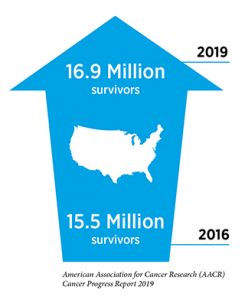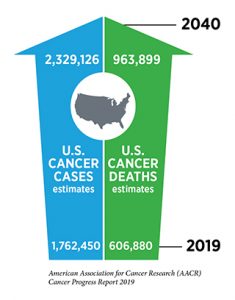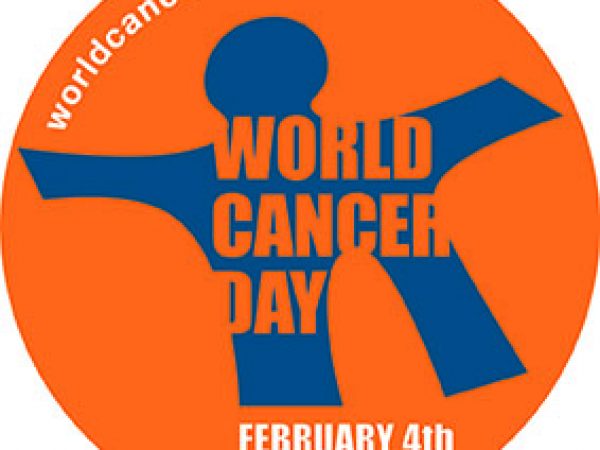AACR Cancer Progress Report 2019: Harnessing Research Discoveries for Patient Benefit
Today, the American Association for Cancer Research (AACR) released its ninth annual Cancer Progress Report. The report highlights how research largely supported by federal investments in the National Institutes of Health (NIH) is spurring improvements in public health and innovative breakthroughs across the spectrum of cancer care.
The report is prefaced by a message from Elaine R. Mardis, PhD, AACR President, and Margaret Foti, PhD, MD (hc), AACR chief executive officer. This message is reproduced below. You can read the full Cancer Progress Report here and watch a summary of the report in this video.
A Message From the AACR
There has never been a greater time in history for the cancer field. In the United States, overall cancer incidence and death rates are declining, and the number of cancer survivors has reached a record high. This unparalleled progress against the collection of devastating diseases we call cancer is being driven by research that is spurring improvements in public health and breakthroughs across the spectrum of cancer care. Moreover, we are now poised to drive forward and deliver further transformative advances that will save more lives from cancer.
The AACR Cancer Progress Report 2019 provides a comprehensive overview of the remarkable progress we are making because of medical research, much of which is supported by federal investments in the National Institutes of Health (NIH). As highlighted in the report, federal funding for medical research has unleashed a surge in scientific discovery and technological innovation that has deepened our knowledge of the complexity of cancer and accelerated the rate at which this knowledge is being harnessed to develop new and better approaches to preventing, detecting, diagnosing, treating, and curing cancer.
In the past year, we have brought a record number of scientific advances to cancer patients in the form of new treatments for their diseases. Among the new treatments is the first molecularly targeted therapeutic approved for treating cancer based on the presence of a specific genetic biomarker in a patient’s tumor, irrespective of the site at which the cancer originated. This milestone was made possible by decades of laboratory and clinical research. As we continue to unlock the secrets of the human genome, we will make more groundbreaking discoveries in cancer genomics and step further into the era of precision medicine, providing new hope for many more cancer patients who are awaiting more effective treatment options, including children, adolescents, and young adults with cancer.
The extraordinary expansion in the use of immunotherapy is continuing unabated, with new approvals for using this exciting approach to treatment for an additional three types of cancer, including a particularly intractable form of breast cancer called triple-negative breast cancer. The remarkable impact that immunotherapy has had on cancer care is highlighted by the fact that the researchers who conducted the landmark basic research that ignited the immunotherapy revolution were awarded the 2018 Nobel Prize in Physiology or Medicine for their seminal discoveries.
Even though more and more people are living longer, higher quality lives after a cancer diagnosis, we cannot escape the reality that there is a vital need for continued transformative research. This urgency is underscored by the sobering reality that cancer will claim more than 606,000 lives in the United States this year. This number is predicted to grow considerably in the coming decades largely because of overall population growth and because cancer is mainly a disease of aging, and the segment of the U.S. population age 65 and older is growing.
Moving forward, we need to ensure that there is no erosion of the spectacular progress we are making in curbing cigarette smoking, which is the leading cause of cancer in the United States. Thanks to the implementation of nationwide comprehensive tobacco control initiatives, the cigarette smoking rate among U.S. adults has fallen to 14 percent, down from 42 percent in 1965. This progress is at risk, however, because of the rapidly growing popularity of a new generation of tobacco products called electronic cigarettes (e-cigarettes).
E-cigarettes deliver very high levels of nicotine, which is extremely addictive, and emit numerous potentially toxic substances. Youth who use e-cigarettes are more likely to transition to conventional cigarettes. Therefore, the AACR is very concerned that the number of high-school and middle-school students using e-cigarettes jumped 78 percent and 49 percent from 2017 to 2018, respectively, and our organization is steadfastly committed to working with all stakeholders to address this emerging epidemic.
As we look to the future, we strongly believe that we have never been in a better position to maintain the positive momentum against cancer. The next wave of innovative breakthroughs that will transform cancer care is within our grasp. We have the scientific knowledge, cutting-edge technologies, and capability to deliver unprecedented advances to patients. We also have bipartisan leadership in Congress that has delivered four consecutive years of steady, significant annual funding increases for the NIH, which will help us take advantage of these extraordinary opportunities.
Ensuring that medical research remains a priority for our nation’s policymakers is vital if we are to further accelerate our pace of progress. Thus, the AACR urges Congress to continue to support robust, sustained, and predictable annual growth of the NIH budget, and to provide consistent and sufficient annual funding for the U.S. Food and Drug Administration and the Centers for Disease Control and Prevention. These actions will guarantee that we make major strides toward the goal of preventing and curing cancers at the earliest possible time.






